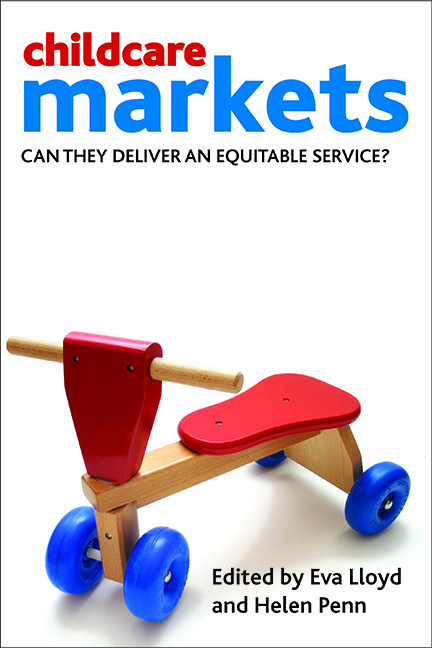eleven - Need markets be the only show in town?
Published online by Cambridge University Press: 01 September 2022
Summary
Introduction
This chapter is about what happens when democracy becomes sclerotic and a society falls prey to fundamentalist dogma that claims to have the right answer for everything: in short, when neoliberal capitalism becomes a hegemonic system of thought and practice, with its unswerving belief in the virtues of markets and the private, of competition and inequality, and of calculation and individual choice. But it is not a general account of this phenomenon, rather a study of how it plays out in one small part of the neoliberal world – early childhood education and care (ECEC) in England.
Nor is this chapter solely critique. It is also about the possibility of thinking differently and an exercise in putting the neoliberal approach to ECEC where it belongs: in perspective, as but one of a number of alternatives, a possibility rather than a necessity. In particular, the chapter explores just one of these alternatives, an ECEC inscribed with democracy as a fundamental value. But first, by way of introduction, a short account is needed of how ECEC in England came to take its current form, what might be termed an ECEC of regulated markets.
ECEC in England: a case study in regulated markets
England presents a distinctive system of early childhood education and care. It is a split system: despite administrative unification within the education ministry, the country continues to have two quite distinct sectors – ‘childcare’ and ‘early education’ – each with different access, funding, workforces and, to a large extent, types of provision. Nothing strange there, most countries have such systems (Kaga et al, 2010). But then add in other ingredients: marketisation of both sectors, with providers competing for the business of parent-consumers; a mixed bag of public and private providers, including a large number of ‘childcare’ services run as businesses for profit; and last but not least, a centralised system of regulation by a powerful nation state. All this adds up to a regime that might be typified as a centrally regulated market.
Why did England come to adopt this approach to ECEC? Like many English-speaking countries, ECEC was low on the policy agenda in England for decades after the Second World War (Tizard et al 1976; Randall, 2002; Penn, 2009).
- Type
- Chapter
- Information
- Childcare MarketsCan They Deliver an Equitable Service?, pp. 191 - 208Publisher: Bristol University PressPrint publication year: 2012

